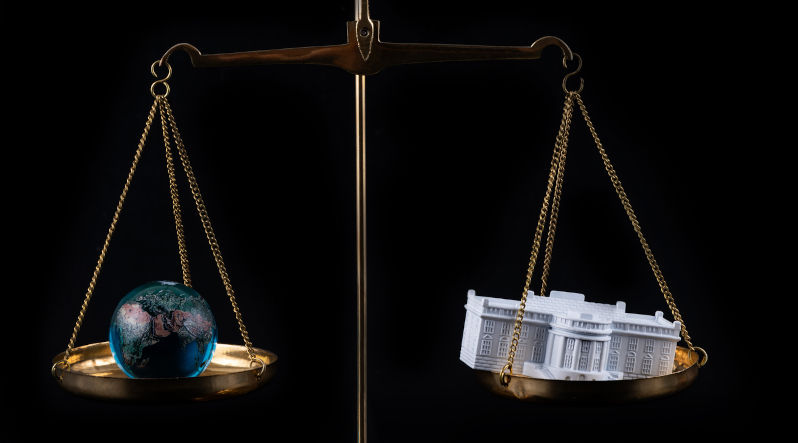Disengaging from the dangerous alliance
September 25, 2025
When, in the course of close — some would say politically intimate — relations between allies, the dominant partner demands that the subordinate partner betray its democratic principles as a cost of receiving favourable treatment, the time has come to terminate the relationship. Such is now the state of the Australia-US alliance.
This point was reached in July this year when US Undersecretary of Defence, Elbridge Colby, in the context of the Pentagon’s review of AUKUS, confirmed reports that the US wanted Australia to make commitments about how it would act in the event of war with China.
Specifically, the US requires of Australia a public declaration or private guarantee that the US-made nuclear-powered submarines would be used in the conflict – the prospect of which is widely forecast in many official circles in Washington.
There is no ambiguity on this demand. Nor is there any evasion of the threat dilemma Australia is subject to: the surrender of national sovereignty, or the termination (or something close to it) of the AUKUS agreement on the transfer of Virginia Class SSNs to Australia.
This, politically and logically, should be the inflexion point for a fundamental reappraisal and reconfiguration of the relationship.
To be sure, it will not challenge the compelling (but frequently truncated and/or poorly articulated) arguments by successive governments, for a future submarine force in the defence of Australia. But, given the urgent need for a successor to the Collins Class, it will almost certainly change its configuration, and some of its modes of operation.
More importantly it will reaffirm Australian sovereignty over decisions relating to the appropriate national means of defending the country.
The times require caution and change, and in that order. The old exhortation to act needs, for a while, to be reversed. We need to stand, and reflect, not just do something. The latter urge — impatience — has been master for too long.
The need, accordingly, is to make sense of the present rather than to react to it without understanding. The time spent will be well spent.
It is a time of large hopes, high risks, desperate efforts, and fearful culminations – many of which are self-sustaining. It is a time of death – and not just of physical death but, in so many places we are witnessing spiritual death, the death of global conscience, of democracy and international law.
In times past, Australia’s default option in such times would be a turn towards the US, but that recourse, as indicated, is now fraught with danger.
In any case, that recourse — reflexive by nature — was long overdue for a close examination of all that it entailed.
This need predated Trump. The current president, spectacularly perverse and offensive as he is, is not so much an aberration as a natural outcome of the system. When he leaves office, the system that produced him will remain; it is entrenched.
Those who foresee or hope for a post-Trump restoration of the US to its hegemony of bygone days miss two points: first, in the words of a famous lament, “those days are past now, and in the past they must remain;” second, in those days it was deemed expedient in Canberra to overlook the symptoms of contradiction and decline and/or failure that are now manifest – but no longer.
In fact, not only has the US lost its pre-eminence, but it is also just about finished as a great power, if a great power is defined comprehensively. It has, once again, turned in on itself.
Domestically, America’s prodigious economy concealed chronic pathologies that run deep and are found in every aspect of American social life – health, education, housing, welfare, and the justice system. Collapse was pernicious.
Globally, even with the mightiest military machine on the planet the record, over decades, is one of force and power not being applied to well-articulated ends.
In summary form, this was not only predictable, but a logical, close to inevitable outcome of what I am describing as its four original sins:
-
the genocide of the indigenous Americans,
-
slavery, and the Civil War which, though it preserved the Union, left white supremacy intact,
-
the falling away from principles enunciated by Presidents Washington, Jefferson, and John Quincy Adams with respect to foreign relations – to avoid all forms of alliances and interventions, and,
-
an unwavering commitment to a democracy-proof constitution.
And any notion of responsible and accountable government was further subverted by the Manhattan Project as it became a vehicle for dramatically increasing the power of the presidency through a regime of extraordinary secrecy which, though it could be justified in wartime, simply became normalised after 1945, thus redefining government as a national security state.
All of this required the famed system of checks and balances to fail, and it did, and it was not a surprise – it was always incipiently unstable, prey to powerful, well-resourced, committed, and disciplined minority forces that tend to triumph if the majority do not pay attention or are passive. And they didn’t, and they were.
The polite term for defining politics in the US is that they are “post-democratic” – meaning that, despite the existence of elections, the majority does not necessarily rule. Substantive democracy, illusory at the best of times, is now certifiably dead.
Study after study over decades have concluded that power is concentrated in the hands of a small subset of society: a plutocracy or an oligarchy, depending on how the research question is framed.
To all of this we must add corruption. One leading commentator has described the current system as corporate-based governance, while an insider sees it as a “coin-operated kleptocracy".
Here, we might recall Sir Edward Grey’s melancholy comment regarding Europe on the eve of the Great War because it is a remarkably close fit to contemporary America: “The lamps are going out and we shall not see them lit again in our lifetime.”
It is imperative, therefore, that Australia understands the present and its relationship to its traditional method of national defence problem-solving – to become one with a dominant alliance partner in the hope that it will deliver security.
Foremost, is the need to understand the trajectory that the US is on as a global engine of change – most especially for its own sake, but also if the objective is an amelioration of the brutal state of global politics.
Specifically, the question the present and the future ask is this: will the customary form of response — a default to the arrangements negotiated withing the alliance with the US — be appropriate?
For many, this question persists despite the disfigurements of the US. These, according to some calculations, are tolerable if the US retains its capabilities for providing what are held to be traditional alliance benefits through traditional great power strategies.
An indulgence of this magnitude requires a closer look at the regard for, and the efficacy of alliances.
In the present and in the immediate future it would be wise to regard unpredictability as the Trump Administration’s hallmark. Positions and decisions are taken in a fashion that veers from the cavalier, to the capricious, to the mercurial. Agreements and treaties are casually repudiated.
This was the abiding concern of presidents Washington, Jefferson, and John Quincy Adams; all counselled the same imperative: avoid all forms of alliances and interventions.
And Henry Kissinger’s observation that, while “it may be dangerous to be America’s enemy… to be America’s friend is fatal" should be not only heard, but listened to.
Beyond these voices, there are the exhaustive studies based on massive databases including the Correlates of War project — which covers the period since the Congress of Vienna (1814-15) — which shred the veil of confidence in alliances.
In summary form, alliances and balances of power — the latter being the bastard child of one of the most misunderstood strategic concepts, deterrence — do not stave off war; indeed, the findings indicate the exact opposite.
The conclusions to the research are unambiguous: “It is now clear that alliances, no matter what their form, do not produce peace but lead to war."
There are a very small number of exceptions but the best light that can be cast upon them in the modern era is that they are most successful when of short duration for a single purpose.
A corollary of this is that large alliance formations tend, over time, to include members who are motivated by opportunism rather than genuine co-operation and are additionally prone to fragility because they have added weak links or links that are corrupt or unreliable.
Worse, when war does come, the research concludes that the pursuit of standing — the centralising of honour and esteem and being hailed as a valued partner or member of the alliance on the basis of excellence in certain activities — is the leading cause of war and accounts for approximately 60% of the motivation for war; the traditional IR realist motivation of security for less than 20%.
In this context the record of the US should give pause: since independence, the US has been engaged in war for a total of 263 years, or more than 93% of its existence. It has also engaged in more than 470 interventions since 1798, including over 250 since 1991.
This suggests that America’s enemies are endemic to the world. But that is only partly true. Global powers are defined by their global interests, global presence, but also, unsurprisingly, global opposition. As moths to a flame they attract adversaries and enemies.
Subordinate allies acquire them not so much by genuine cause, but by association, virally if you like.
With that acquisition a base distinction between friend and enemy is effected without justification – and it is ultimately realised in the questions: who are Australians prepared to kill, and who, or what, are Australians prepared to die for?
The views expressed in this article may or may not reflect those of Pearls and Irritations.


